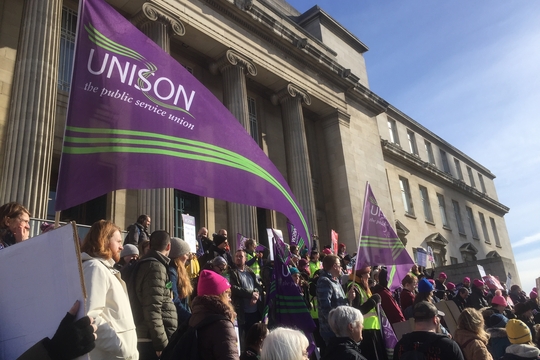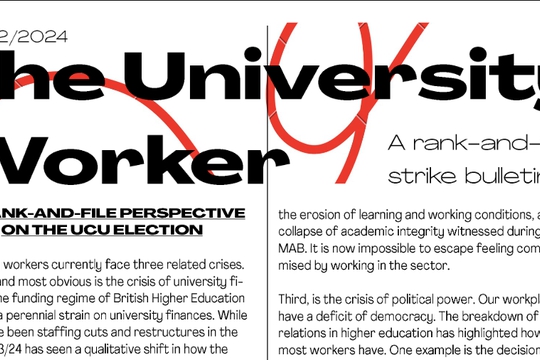The New Year Starts, The Struggle Continues
by
The University Worker
October 14, 2024
On the need to keep the pressure on, and organise disputes from the ground up over the coming months.

bulletins
The New Year Starts, The Struggle Continues
by
The University Worker
/
Oct. 14, 2024
On the need to keep the pressure on, and organise disputes from the ground up over the coming months.
The University Worker is a rank-and-file bulletin made by university workers, that has been produced since 2018.
In our last bulletin we spoke of the three interrelated crises facing higher education: a financial crisis, around the funding for the sector; a moral crisis, around our institutions complicity to the ongoing genocide in Gaza; and a political crisis, over the deficit in democracy within our workplaces. As the new academic year starts, the crises facing higher education haven’t disappeared - if anything they are getting worse.
As we speak, many university managers anxiously await their final student enrolment figures. The previous Tory government’s racist ban on international taught postgraduates bringing their dependents with them when they come to study in the UK, has led to a drop in international student visas by over 16%. A lack of public funding for the sector seems set to continue. We are hearing rumours of which universities may be the first to fold, as students and workers alike anxiously wait to see if their institution will still exist in a few months. The response from employers and politicians has not been to criticise the marketised system of higher education that treats students as cash cows and has so obviously ravaged our sector. Rather predictably, they wish to intensify it, calling for an increase in tuition fees, and subsequently, a continued reliance on competitive and ultimately finite student recruitment drives.
The moral crisis in our sector hasn’t decreased either. Israel has extended its genocidal ground war into Lebanon. The new Labour government continues to support Israel’s genocidal war, with our universities continuing to supply the research that allows new arms technology to be used to brutalise and kill Palestinians. As the new year starts, we have already seen student-led walkouts and other actions against this genocide pick back up. It is our duty as university workers to build on these foundations and further escalate our fight over the coming year against our institution’s support for Israel’s genocide.
Similarly, the political crisis in our institutions continues. As more and more universities plan major restructures and redundancies, we, the workers whose labour guarantees their continued existence and who will experience their effects, have no say in how our institutions are run. Meanwhile, senior managers shut down vibrant departments, whilst running up debts through financial mismanagement and vanity projects.
Whilst these crises intensify, we cannot just sit on our hands and wait. Nationwide industrial action will be key not only to fight back against the effects of these crises, but recompose our political organisation as a workforce in a manner that can seriously challenge them in the years to come. However, the response to a renewed call for industrial action this year from our national unions is confusing, to say the least.
In the recent UCU branch delegate meeting, to discuss UCEA’s most recent offer, 66% of branches voted to reject the pay element, whilst also voting 58% to accept UCEA’s terms on working conditions (including their next to nothing offer on casualisation). Overall, 62% of branches voted to reject UCEA’s full offer. However, when asked whether their branch would be willing to take industrial action, 46% of branches voted no, narrowly beating the yes vote on 45%. At the same time, strangely, 76% of branches agreed with balloting UCU members for industrial action in higher education. The outcome is confusing, but it seems UCU nationally is moving to organise a consultative ballot of its members, with it remaining unclear whether a national industrial action ballot will take place at all this year. In some local branches, however, reps are already discussing how they could initiate local disputes if a national ballot does not take place. While the national union is putting resources into local bargaining, suggesting a strategic reorientation away from national disputes.
In UNISON, after a consultative ballot in which almost 80% of members voted to reject UCEA’s offer, the Higher Education Service Group Executive (HE SGE) voted to initiate a ballot for industrial action to take place between 15 November and 9 January. However, in response to UCU’s unclear stance on industrial action, it seems some on the SGE are now pushing to change these plans - and potentially cancel all ballots for industrial action completely. This decision will be made at an extraordinary meeting of the SGE on Friday 18th October, with pre-meetings being organised in some regions to allow branch reps and ‘activists’ to debate their views on the matter. For example, in Greater London, UNISON reps should have received details through their branches for an online meeting on Wednesday lunchtime to discuss this issue.
For us, nationally coordinated strike action this year is of utmost importance, for several reasons.
The first is economic, in relation to UCEA’s offer. The pay offer includes a wage increase of less than 3% for most academic workers, while those on the lower end of the salary scale are being offered a raise between 3% and 5.7%. This pay offer does nothing to address the decades of below-inflation pay increases. In terms of working conditions, UCEA has essentially offered us nothing of value for the cascading problems we are facing. They refuse to seriously negotiate on issues of workload, a standard 35-hour working week across the sector, and most significantly, on the issue of casualisation.
The second is political. Mass strike action presents an opportunity to reinvigorate labour movements and cultivate more advanced political formations within the workforce. They offer an array of picket lines, meetings and other events to debate and discuss the state our sector is in, and put forward more coordinated political demands around democratic control of our institutions and their funding. In this sense, strikes could escalate political militancy in our sector around other issues - such as Palestinian liberation, offering the potential to (unofficially) adopt demands to end our institutions’ and state’s complicity with the genocide in Palestine, and offer a new combative component to this internationalist movement. For all these reasons, we cannot delay strike action - by six months, a year, or more. We must keep up the pressure on our employers, and take advantage of the potential political openings it could offer us right now.
However, it is increasingly obvious that we cannot rely on our national unions to initiate this industrial action. UCU and UNISON’s central offices both seem to be wavering in their support for any industrial action this year. We can only rely on ourselves - as university workers on the ground - to push and coordinate such action from the bottom up. This means both pressuring our central unions to call for national industrial action - such as through arguing this position at one of the upcoming UNISON regional meetings on the issue this week - and coordinating it on the ground ourselves if our national unions refuse to.
If UCU delays or refuses to ballot members, then UNISON members must be confident that they can carry the torch and organise strikes that shut down our universities. We often forget that it is (lower-paid) UNISON members who do the essential work that keeps our institutions running - whether that be cleaning the classrooms, unlocking the buildings, staffing the libraries and more. UCU members must be ready to organise in their local branches to initiate their own local disputes, and coordinate with other branches to join up demands and take industrial action at the same time.
Organising larger, national disputes from the bottom up, without the support of our central unions, is not impossible to do. Although operating in a different context, university workers in the US have coordinated a series of major strikes - some in previously non-unionised universities - through their “From the Upsurge” network. A workshop on the lessons of this experience will be presented by Ellen David Friedman, chair of Labor Notes, at the next university worker day school this Sunday 19th October, 11am - 4pm, both in-person at St Margaret’s House, London (EH7 6AE) and online. You can register for the day school here.
As university workers, now more than ever we cannot afford to ease the pressure. It is our duty - to ourselves, to those in Palestine, and the working-class more broadly. We must keep fighting!
author
The University Worker
Subscribe to Notes from Below
Subscribe now to Notes from Below, and get our print issues sent to your front door three times a year. For every subscriber, we’re also able to print a load of free copies to hand out in workplaces, neighbourhoods, prisons and picket lines. Can you subscribe now and support us in spreading Marxist ideas in the workplace?


